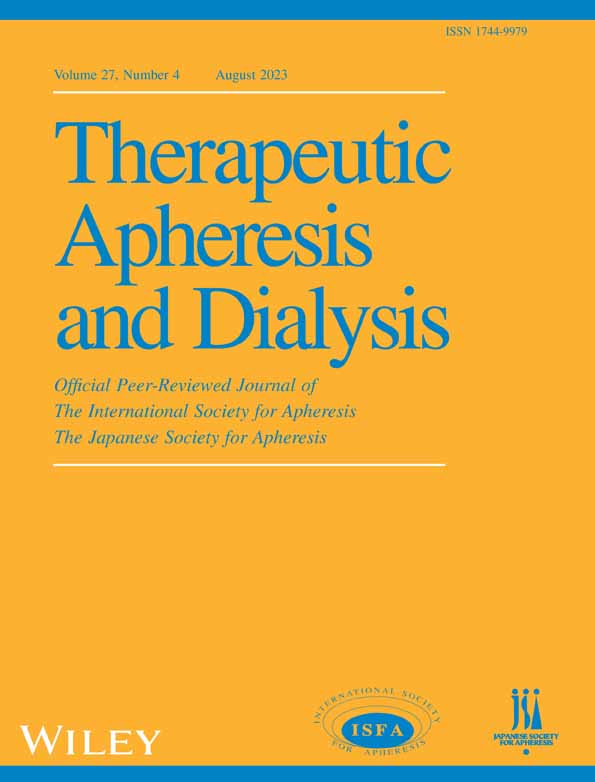Changes in erythropoiesis-stimulating agent responsiveness after transfer to combined therapy with peritoneal dialysis and hemodialysis for patients on peritoneal dialysis: A prospective multicenter study in Japan
Abstract
Introduction
Inadequate dialysis and fluid overload are corrected after starting combined therapy with peritoneal dialysis (PD) and hemodialysis (HD). However, the effects on anemia management has not been elucidated.
Methods
We conducted a prospective, multicenter, observational cohort study of 40 PD patients (age, 60 ± 10 years; male, 88%; median PD duration, 28 months) starting combined therapy and investigated changes in several clinical parameters, including erythropoiesis-stimulating agent (ESA) resistance index (ERI).
Results
ERI decreased significantly during 6 months after switching to combined therapy (from 11.8 [IQR 8.0–20.4] units/week/kg/(g/dL) to 7.8 [IQR 3.9–18.6] units/week/kg/(g/dL), p = 0.047). Body weight, urinary volume, serum creatinine and the dialysate-to-plasma creatinine ratio (D/P Cr) decreased, whereas hemoglobin and serum albumin increased. In subgroup analysis, the changes in ERI were not affected by cause for starting combined therapy, PD holiday and D/P Cr.
Conclusion
Although detailed mechanism was unclear, ESA responsiveness improved after switching from PD alone to combined therapy.
CONFLICT OF INTEREST STATEMENT
Yukio Maruyama has received lecture fees from Baxter International, Inc. and Terumo Corporation. Ken Sakai has received advisory fees from JMS Co., Ltd. Yoshihiko Kanno has received lecture fees from AstraZeneca, Inc., Kyouwa Kirin Co., YL Biologics Co., Nobelpharma Co., and Fuji Yakuhin, Co. Munekazu Ryuzaki has received lecture fees from Baxter International, Inc., Kyouwa Kirin Co. and Bayer Yakuhin, Ltd. Tsutomu Sakurada has received scholarship funds from Baxter International, Inc. and Terumo Corporation. Tatsuo Hosoya worked in the Department of Pathophysiology and Therapy in Chronic Kidney Disease in positions endowed by Baxter International, Inc. at Jikei University School of Medicine. Masaaki Nakayama has received research grants from Baxter International, Inc. The funders played no role in study design, data collection and analysis, decision to publish, or preparation of the manuscript. No other authors have any conflicts of interest to declare.




